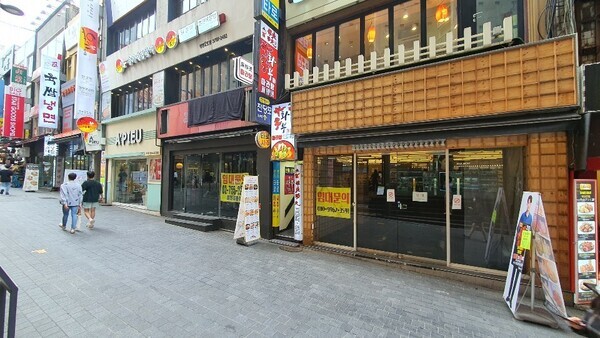hankyoreh
Links to other country sites 다른 나라 사이트 링크
Seoul lost around 20,000 businesses between first and second quarters of 2020

The COVID-19 pandemic and the economic slowdown have caused the number of commercial properties in Seoul to decrease by about 20,000 between the first and second quarters of the year, new data shows.
On Sept. 7, housing information provider Real Estate 114 released the results of its analysis of commercial property data tracked by South Korea’s Small Enterprise and Market Service. The analysis found that there were 370,321 commercial properties in Seoul at the end of the second quarter of 2020 (Q2), 21,178 fewer (5.4%) than the 391,499 reported at the end of the first quarter (Q1).
The Q2 decline in commercial properties in the city was observed in all business categories. There was a particularly sharp decline in restaurants, which fell from 134,041 in Q1 to 124,001 in Q2, down 10,040 (7.5%). In other words, restaurants account for around half of the decline in commercial properties over the past three months.
Along with restaurants, the number of retail outlets (including convenience stores and corner stores) decreased by 3,950, and the number of lifestyle service outlets (including print shops and hair salons) decreased by 3,473. “As an increasing number of companies allow employees to work from home because of concerns about COVID-19 infection, fewer people have been dining out and organizing team dinners. That has driven down sales, forcing the closure of restaurants that are unable to cover fixed expenses such as wages, inventory, and rent,” Real Estate 114 said.
In terms of percentage, the sectors that were hardest hit were tourism, leisure, and entertainment, including computer gaming cafés and adult establishments. Taken together, these sectors shrank by 1,260 establishments (10.8%), from 11,714 in Q1 to 10,454 in Q2. One apparent factor is that the government has placed restrictions on businesses that normally cater to a large number of customers in order to prevent COVID-19 infection clusters. Another is that some customers have stayed away, deterred by the requirement to leave their contact information on a visitors’ log.
“We expect there to be a continuing decline in the number of commercial properties in Seoul in the third quarter. If struggling small business owners are forced to close, it’s likely to cause a range of socio-economic issues including vacant storefronts and household debt. Countering those issues will probably require wide-ranging assistance from the government,” said Lee Gyeong-hui, senior analyst for Real Estate 114.
By Choi Jong-hoon, staff reporter
Please direct comments or questions to [english@hani.co.kr]

Editorial・opinion
![[Column] Season 2 of special prosecutor probe may be coming to Korea soon [Column] Season 2 of special prosecutor probe may be coming to Korea soon](https://flexible.img.hani.co.kr/flexible/normal/500/300/imgdb/original/2024/0426/3317141030699447.jpg) [Column] Season 2 of special prosecutor probe may be coming to Korea soon
[Column] Season 2 of special prosecutor probe may be coming to Korea soon![[Column] Park Geun-hye déjà vu in Yoon Suk-yeol [Column] Park Geun-hye déjà vu in Yoon Suk-yeol](https://flexible.img.hani.co.kr/flexible/normal/500/300/imgdb/original/2024/0424/651713945113788.jpg) [Column] Park Geun-hye déjà vu in Yoon Suk-yeol
[Column] Park Geun-hye déjà vu in Yoon Suk-yeol- [Editorial] New weight of N. Korea’s nuclear threats makes dialogue all the more urgent
- [Guest essay] The real reason Korea’s new right wants to dub Rhee a founding father
- [Column] ‘Choson’: Is it time we start referring to N. Korea in its own terms?
- [Editorial] Japan’s rewriting of history with Korea has gone too far
- [Column] The president’s questionable capacity for dialogue
- [Column] Are chaebol firms just pizza pies for families to divvy up as they please?
- [Column] Has Korea, too, crossed the Rubicon on China?
- [Correspondent’s column] In Japan’s alliance with US, echoes of its past alliances with UK
Most viewed articles
- 1Division commander ordered troops to enter raging flood waters before Marine died, survivor says
- 2‘We must say no’: Seoul defense chief on Korean, USFK involvement in hypothetical Taiwan crisis
- 3Is N. Korea threatening to test nukes in response to possible new US-led sanctions body?
- 4No good, very bad game for Korea puts it out of Olympics for first time since 1988
- 5Korea’s 1.3% growth in Q1 signals ‘textbook’ return to growth, says government
- 6US overtakes China as Korea’s top export market, prompting trade sanction jitters
- 7[Column] Has Korea, too, crossed the Rubicon on China?
- 8[Column] ‘Choson’: Is it time we start referring to N. Korea in its own terms?
- 9Will NewJeans end up collateral damage in internal feud at K-pop juggernaut Hybe?
- 10Samsung subcontractor worker commits suicide from work stress